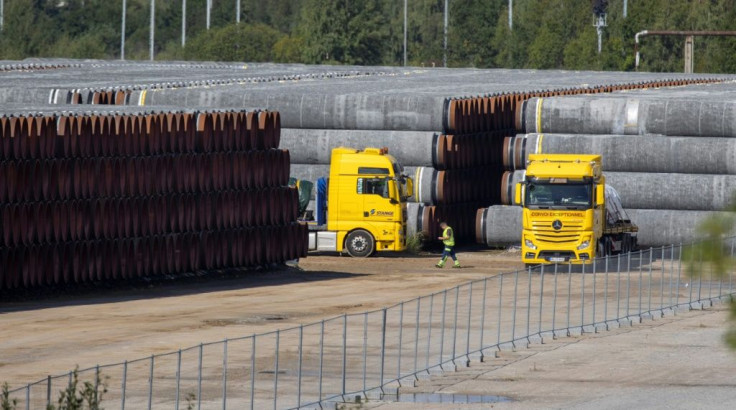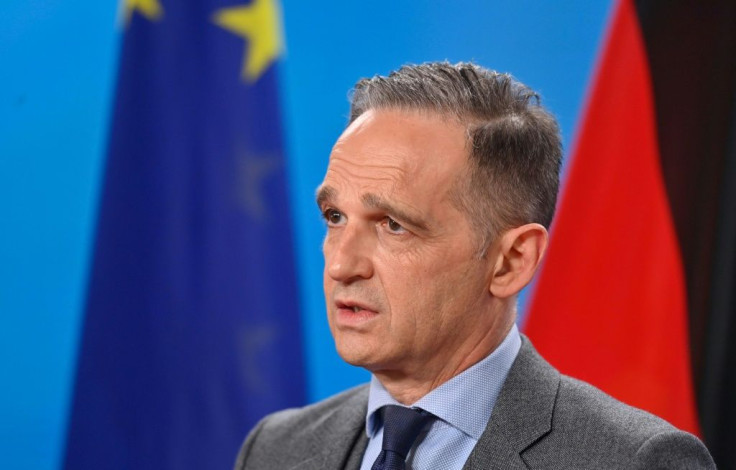US Waives Sanctions On Nord Stream 2, Builder Of Russia-Germany Pipeline
US President Joe Biden's administration on Wednesday waived sanctions against Nord Stream 2, the Russian-controlled builder of a Russia-Germany gas pipeline, which Washington has called a geopolitical security risk.
Secretary of State Antony Blinken said in a letter to Congress that waiving the original sanctions mandated by Congress for Swiss-based Nord Stream 2 AG, and its chief executive Matthias Warnig, "is in the national interests of the United States."
The move defused tensions between Washington and Berlin over the $12-billion project, which Germany and other European countries see as crucial to securing long-term energy supplies to the region.
Germany had rejected the looming imposition of sanctions as interference in its domestic affairs.

In a statement Blinken said the Biden administration nonetheless remains committed to its position against Nord Stream 2.
"We will continue to oppose the completion of this project, which would weaken European energy security and that of Ukraine and Eastern flank NATO and EU countries," he said.
"Our position is in line with our commitment to strengthen our transatlantic relationships as a matter of national security."
The 745-mile (1,200-kilometer) pipeline, which is more than 95 percent complete, will run beneath the Baltic Sea and double Russian natural gas shipments to Germany, Europe's largest economy.

Russian giant Gazprom has a majority stake in the project, working alongside an international consortium that includes Germany's Wintershall and Uniper groups, Dutch-British giant Shell, France's Engie and Austria's OMV.
Gazprom also controls Nord Stream 2 AG whose chief executive, Warnig, is reportedly close to Russian President Vladimir Putin.

Wednesday's ruling was a significant reversal of Washington's earlier stance.
In 2020 the possibility of US sanctions held up pipeline-laying operations for nearly one year.
Work resumed in December under the ongoing sanctions threat. In March Blinken said in Brussels that the pipeline would undermine Europe's interests and energy security goals.
The Nord Stream 2 project "is a bad idea. Bad for Europe, bad for the United States," he said at the time, threatening sanctions against "any entity involved" in the project.
Earlier Wednesday, Germany's foreign minister Heiko Maas welcomed the expected move as a conciliatory step.
"We understand the decisions that have been taken in Washington as taking into account the really extraordinarily good relationship that have been built with the Biden administration," Maas said.
The State Department did approve sanctions on several vessels and smaller companies and organizations involved in building and administering the pipeline.
Kremlin spokesman Dmitri Peskov welcomed the expected move, saying: "It's better than reading announcements of new sanctions. It would certainly be positive."
But the move was strongly criticized by Republican Senator Jim Risch, who called the waiver "a gift to Putin that will only weaken the United States' leverage in the lead up to the impending Biden-Putin summit."
"The administration is prioritizing perceived German and Russian interests over those of our allies in Central, Eastern and Northern Europe," Risch said in a statement.
The project has long been in the crosshairs of the United States, particularly by the administration of former president Donald Trump, which promoted US gas and openly criticized European countries for buying energy from Russia.
Russian neighbors Poland, Ukraine and the Baltic states also fiercely opposed the pipeline, fearing it would increase Moscow's political leverage in regional politics.
The new pipeline follows the route of the original Nord Stream 1 pipeline, which began operations in 2011.
© Copyright AFP 2024. All rights reserved.





















